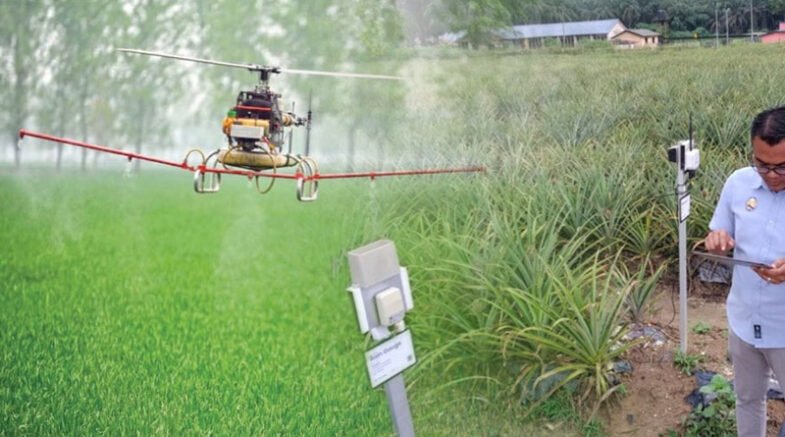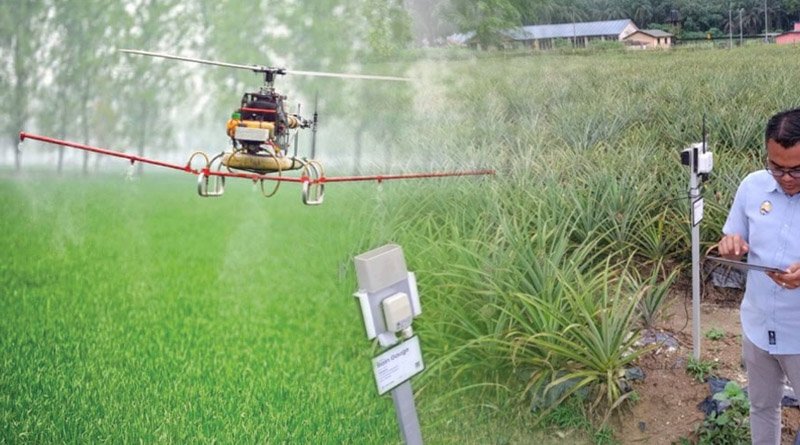In order to lessen reliance on imports, Malaysia aims to increase domestic production using smart farming techs like the Internet of Things (IoT) and precision farming.

In order to lessen reliance on imports, Malaysia aims to increase domestic production using smart farming techs like the Internet of Things (IoT) and precision farming.
According to Science, Technology, and Innovation Minister Chang Lih Kang, Malaysian farms may one day be outfitted with remote-controlled sensors, drones, and robots to monitor, water, and fertilise crops as the nation works to increase food security.
“Smart farming techs such as IoT can be used by farms to manage everything from temperature and humidity to soil pH. Even long-distance farming is possible for them. Say you’re at home, you can see all the readings on your phone, so you can control it, “According to Mr. Chang.
“There is no waste; everything is very precise.” IoT devices can also be used for tasks like precision fertilisation, crop monitoring, and greenhouse climate control. Drones and robots can automate farming tasks more intelligently and sustainably, increasing crop and livestock yields while using less water, energy, and labour.
The government is implementing three similar pilot projects in the states of Perak and Johor in an effort to replicate the success of an independently owned, pesticide-free aquaponic farm that uses IoT to grow organic lettuce and spinach while also raising tilapia in Perak. In order to address issues with food security, it hopes that the use of IoT in agriculture, where Internet-connected devices monitor and perform tasks on farms, will spread.
“That, in my opinion, is the way to go, particularly when discussing food security. When you talk about food security, you’re talking about both the quality of the food and its availability, including whether it’s safe to eat “Mr. Chang added. Other technologies being tested include methods to speed up harvesting times, boost yield, and make crops more pest-resistant.
The high initial cost, however, might present a challenge. An IoT system is estimated to cost about RM50,000 (S$15,000) for a farm of about 930 square metres, excluding other necessities like seeds and a greenhouse, all of which could cost a farmer about RM500,000.
Malaysia, like many other nations, is heavily dependent on imports for basic food items despite having an abundance of resources and land. Labor shortages, low levels of automation and technology adoption, a high reliance on foreign labour, and low levels of automation are some of the problems the agriculture sector is facing.
Due to a global increase in the price of animal feed brought on by the Ukraine war in 2022, Malaysia experienced a shortage of poultry, which resulted in a ban on exports to Singapore. The new administration now places a high priority on food security. Malaysia aims to increase fish production from aquaculture from 26% of total fish production to 60% over the next two to seven years.
The country’s beef self-sufficiency ratio is also expected to rise to 50% by 2025. 82% of the beef consumed in Malaysia is currently imported.
In addition to these initiatives, the National Grain Corn Industry Blueprint aims to increase animal feed corn production to 600,000 tonnes within the next 10 years in order to reduce reliance on imports by up to 30%. Currently, Malaysia imports almost all of its grain corn, or two million tonnes annually, from nations like Argentina, Brazil, and the United States.
Mohamad Sabu, the minister for agriculture and food security, told ST that the government has designated 400 ha of land for this use and will encourage more young people to enter farming or pursue degrees in smart agriculture, research, and development. To emphasise how seriously the government takes food security, he said, the Ministry of Agriculture and Food Industry has been renamed the Ministry of Agriculture and Food Security.
“The new government is committed to ensuring that the people have access to enough food at prices that are fair in a time when the nation is experiencing food inflation,” said Datuk Seri Mohamad.
In an effort to increase food production through the adoption of contemporary smart farming techs and economies of scale, the National Food Security Policy Action Plan 2021–2025 and the National Agrofood Policy 2021–2030 are currently being put into action. In addition, the government supports sustainable agricultural practises and works to strengthen the food value chain.
“Our top priority remains to increase local food production and self-sufficiency ratio of main food products (rice, vegetables, fruits, chicken, beef, egg, milk, and fish), while also looking to diversify food import sources to meet domestic demand,” Mr Mohamad added.
